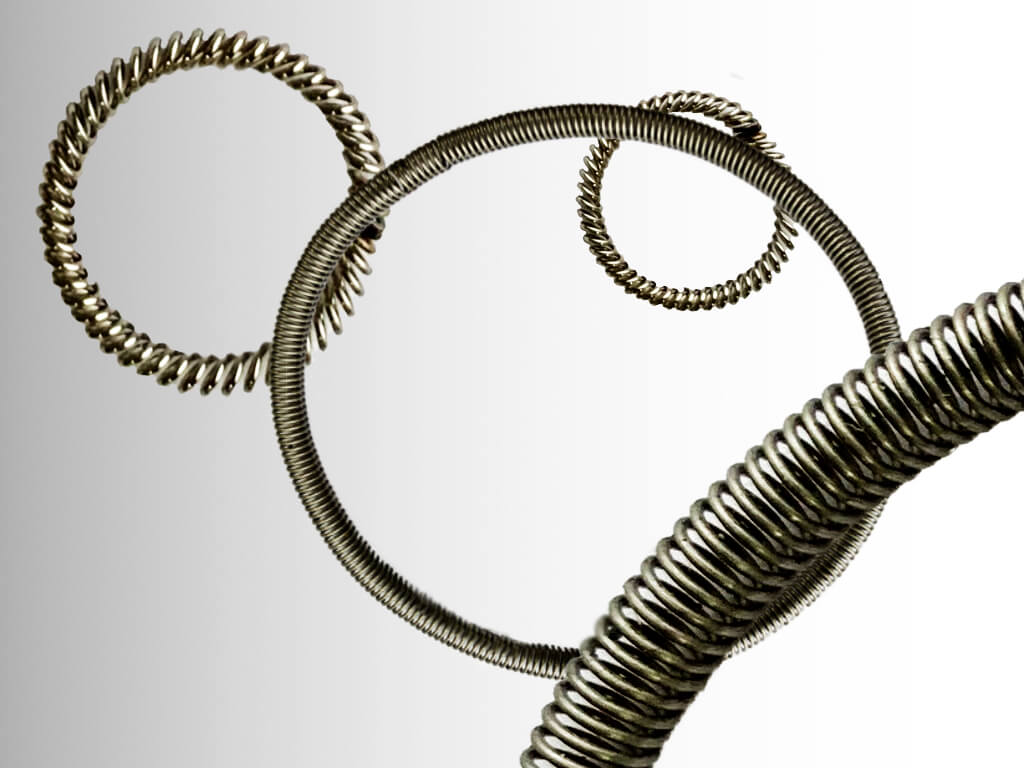Canted coil springs in the medical industry find a wide variety of applications, whether they are providing controlled force, stable electrical contact, or dependable sealing. Canted coil springs, also called slant coil springs, look deceptively simple. In reality, they are finely engineered components that offer something engineers in the medical field can’t do without: predictable performance in tiny spaces where failure is not an option.
In this blog post, we discuss the role of canted coil springs in medical devices, highlighting the features that make them stand out to engineers, their applications, and the design considerations involved in selecting the right type.
The Role of Canted Coil Springs in Medical the Medical Industry
Canted coil springs are angled, or canted, in such a way that they produce nearly constant force across a wide range of deflection. For medical devices, consistent force is often a necessity for reliability. Additionally, pacemakers, robotic surgical tools, and infusion pumps all rely on highly repeatable and dependable performance. The compact shape of these springs also makes them a good fit for miniaturized systems. This includes implantables, where every cubic millimeter counts.
In fact, canted coil springs play a critical role across a wide range of medical technologies. In implantable devices (e.g., pacemakers, defibrillators, and cochlear implants), they ensure long-term, stable connectivity that patients can rely on. Surgical robotics benefit from connectors that incorporate canted coil springs to endure thousands of mating cycles without performance loss, making them easier to service and highly dependable in the operating room. In drug delivery systems such as infusion pumps or implantable reservoirs, spring-energized seals provide a consistent sealing force that enables precise, controlled dosing. Even advanced imaging equipment, including MRI and CT scanners, depends on these springs for EMI/RFI shielding and stable electrical interfaces, which preserve signal quality and reliability.
Why Engineers Rely on Canted Coil Springs in the Medical Industry
There are several key reasons why engineers rely on canted coil springs in medical applications.
Force Deflection Control
Canted coil springs are well known for their highly predictable load-deflection curves. In implantable devices, for example, stability over millions of cycles is essential. A spring that holds its force profile year after year helps reduce fatigue risks and mechanical drift, ensuring the device works as intended throughout its lifespan.
Sealing Performance
In spring-energized seals, canted coil springs are often paired with PTFE or other polymers. The result is a gas-tight, liquid-tight barrier that maintains its performance even in the presence of repeated sterilization cycles, aggressive fluids, and pressure changes. Engineers rely on this type of sealing solution for surgical instruments and drug delivery systems; leakage is simply not acceptable.
Electrical Conductivity
The angled coils on a canted coil spring allow it to be used as a highly reliable multi-contact electrical connectors. Instead of one or two contact points, they create multiple low-resistance electrical paths. These paths remain stable even under extremely harsh conditions that may involve vibration, thermal cycling, and repeated connections. This type of performance leads to lower insertion force, less wear, and added benefits like EMI and RFI shielding. For imaging systems, neuromodulation devices, and implantable electronics, these advantages lead to reliable signal integrity and longer service life.

Design Considerations for Engineers
Designing with canted coil springs can be complicated. Engineers need to tune load and deflection characteristics for the specific application, keeping stress within limits to extend fatigue life. This is made possible through the development of customized cant coil spring geometries.
As devices continue to shrink, tolerance control becomes critical. Finite element analysis is often used to predict performance under repeated load, while integration with polymers such as PTFE will enable hybrid solutions that balance mechanical, chemical, and biocompatibility needs.
Material choice is also vital, as it is where performance meets safety. Engineers typically work with stainless steel (316L), MP35N, Elgiloy, or Inconel due to factors such as corrosion resistance, fatigue life, and compliance with biocompatibility standards, including ISO 10993. For connectors, precious metal coatings like gold or platinum can further improve conductivity while resisting corrosion inside the body. Meeting these material and testing requirements is what makes it possible for springs to go from concept to regulatory approval.
Looking Ahead at Canted Coil Springs in the Medical Industry
As wearable and implantable medical electronics continue to grow, so does the demand for components that are smaller, lighter, and more efficient. Canted coil springs are well-positioned to meet that demand. Ongoing work with additive manufacturing and smart materials may add new features, such as adaptive force profiles or embedded sensors, that further expand their role in next-generation medical systems.
Conclusion
The ability of canted coil springs to maintain precise force, reinforce seals, and ensure electrical reliability makes them indispensable for a wide range of applications, from surgical robots to implantable devices. For engineers tasked with designing systems that must be both safe and dependable, these springs are a proven solution.
If you would like guidance on selecting or customizing canted coil springs for your next medical application, contact Advanced EMC. Our engineering team specializes in matching spring technology to the unique challenges of medical design. Give us a call today.


